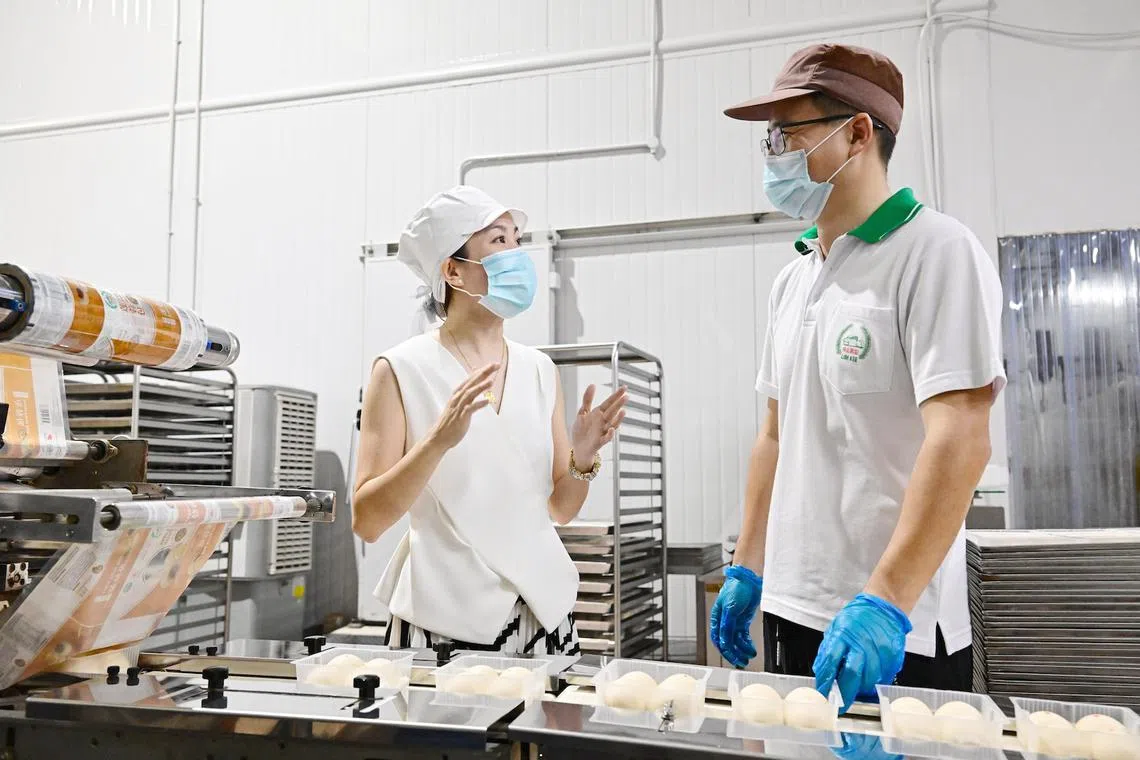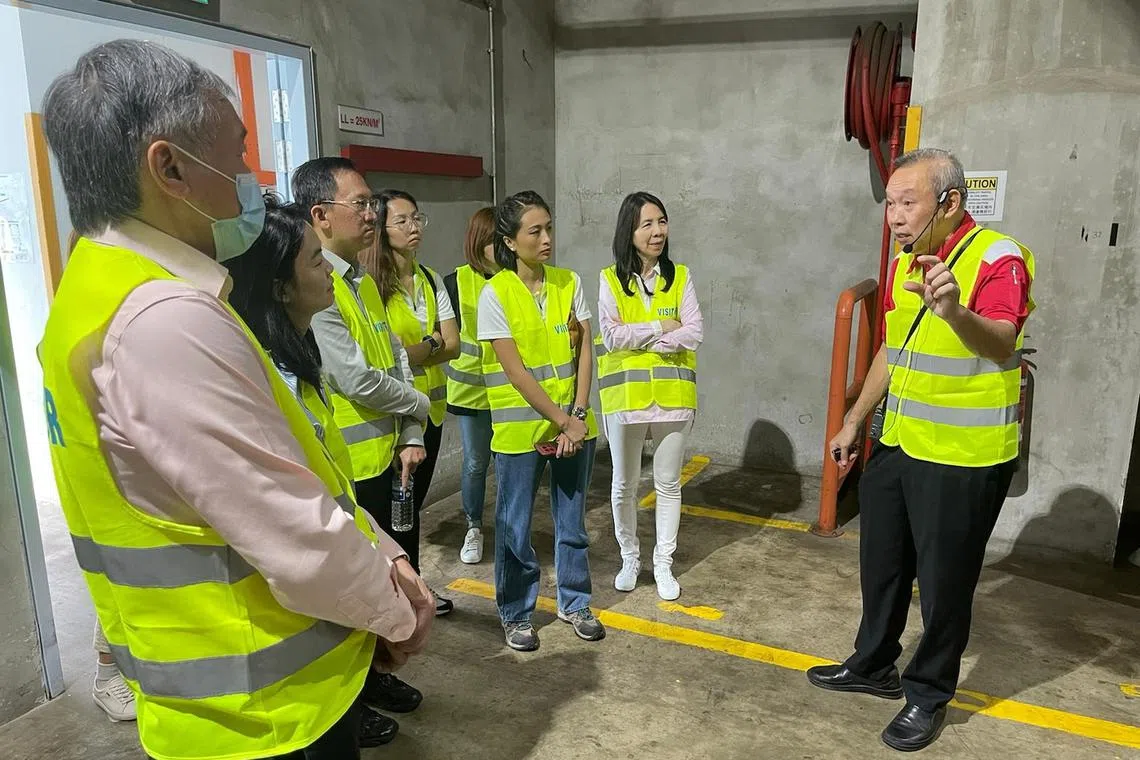Why this local food manufacturer believes young talent is key to tackling labour crunch
It says the exchange of experience and perspectives across its multi-generational staff rejuvenates its ageing workforce and promotes development
Singapore-based Lim Kee Food Manufacturing has weathered economic changes and evolving consumer tastes since it was established in 1982.
Today, the 42-year-old family business faces two key challenges: Adapting to an ageing workforce and attracting new talent.
Ang Shu Min, 36, the second-generation owner of Lim Kee, recognises the looming crisis. “Our workforce is ageing,” said Ang, adding that most of the company’s 65 employees are aged above 40.
“To keep the business going in the long term, we need to start looking at hiring and training younger talent,” said Ang, who is the head of human resources at Lim Kee. The company specialises in manufacturing Chinese-style steamed buns, or pau.
Her solution? The SkillsFuture Work-Study programme, a 12 to 18-month programme that aims to give fresh graduates a head-start in their career. It offers full-time employment with participating companies to gain industry experience, while they receive on-the-job training to build on their school knowledge.
Based on their performance, there is also the opportunity of employment beyond the programme.
Navigate Asia in
a new global order
Get the insights delivered to your inbox.
Since 2018, Lim Kee has hired five fresh graduates from polytechnics and Institutes of Technical Education through the Work-Study programme, in areas such as human resource, food science, quality assurance and e-commerce.
Groom to grow
Lim Kee’s manpower challenges reflect broader trends in Singapore’s business landscape.
Nearly half of businesses (48 per cent) in Singapore struggle to attract and retain younger workers, according to the 2024 National Business Survey on manpower and wages by the Singapore Business Federation (SBF) released in August.
It surveyed 796 businesses in Singapore, of which 82 per cent were small and medium-sized enterprises (SMEs).
A growing number (61 per cent) of businesses also cited a limited pool of local high-skilled labour, up from 40 per cent in 2023. Above all, manpower costs remain the biggest challenge amid a tight labour market for 75 per cent of businesses.

“Investing in workforce skills development is an increasingly important value proposition for enterprises to attract and retain talents,” said Xu Wenshan, director, Enterprise Engagement Division, SkillsFuture Singapore. “A workforce equipped with relevant skills that support business growth is critical for companies to remain viable in the future.”
Reflecting on Lim Kee’s past, Ang noted: “We used to just hire people based on the existing skill sets that they had, which we required.”
But growing manpower challenges, exacerbated by the Covid-19 pandemic in 2020, led Lim Kee to adopt a more strategic approach.
And it has proven effective so far. One of them is human resources assistant Samantha Ong, 25, who joined Lim Kee in 2019 through the SkillsFuture Work-Study programme.
“I’ve been able to apply all the knowledge I learnt, and put it to practice,” said Ong, who has a diploma in human resource management from Republic Polytechnic.
In addition to gaining industry experience and honing her skills, Ong shared that her time at Lim Kee has provided “better clarity” in charting her career path, and fostered a desire to upskill further.
She is currently pursuing a degree in human resources at the Singapore University of Social Sciences, under Lim Kee’s sponsorship.
“I didn’t think much about upskilling before when I first started,” said Ong, “But I’ve learnt that there are so many different aspects to human resources. The more I learn, the better I can be in my role.”
Ang believes that her existing staff, too, benefit from the infusion of young talent. “We often pair our younger and older employees together, because they can learn from each other with their different perspectives.
“This allows us to bridge the age gap, and promote diversity in learning and upskilling within the company.”
Anticipate and adapt
SkillsFuture Singapore’s Xu emphasised that having a “skills-first mindset” towards business transformation is paramount.
“Employers that are more progressive see skills development as an essential part of their business strategy,” she said. “They identify new skills needed for the business, and train their employees to perform their jobs more effectively.
“Doing so places such employers at a higher vantage position, compared to other employers that do not invest in their employees’ development,” she explained.
Research by the Institute for Adult Learning supports this view. Its recent Business Performance and Skills Survey found that the “secret sauce” of Singapore’s best-performing SMEs is their ability to combine strong business and people strategies. However, only one in 10 SMEs do so.
Tips to train
How can businesses, especially SMEs, address key manpower challenges that hinder talent development? Xu Wenshan, director, Enterprise Engagement Division, SkillsFuture Singapore, suggests the following:
No clue? Work with the SkillsFuture Queen Bee in their sector for advice on skills needs and training available, or check out the SkillsFuture for Business portal for more information.
No money? Consider seeking funding support from SkillsFuture Singapore for training programmes, such as the SkillsFuture Enterprise Credit and training subsidies, where SMEs are subsidised up to 90 per cent for course fees.
No time? Take up flexible learning options, short courses and e-learning alternatives that can be integrated into busy schedules. Employers can approach the National Centre of Excellence for Workplace Learning to obtain support for setting workplace learning processes so that employees can learn and work at the same time.
“Yet, those who have done that are more likely to report an increase in profit, revenue and market share, highest staff engagement and lowest attrition,” said Xu.
Xu urges companies to take action sooner rather than later, so as to reap the returns on training, in view of headwinds such as tech disruption, economic shifts, demographic changes and workplace trends.
“Grappling with these conditions should not deter employers from investing in upskilling,” said Xu. “In fact, it makes it even more crucial for business resilience and relevance.”
Seek help to scale up
Given the challenges in talent development and resources, what more can Lim Kee Food Manufacturing do? “Learn from the bigger players,” said Ang Shu Min, its head of human resources.
That player was local supermarket chain Sheng Siong, and its programmes organised through the SkillsFuture Queen Bee initiative.
Launched in 2020, 36 leading industry players, or “Queen Bees”, from different industries have stepped up to mentor and support over 3,500 SMEs through knowledge and skills exchanges.

“As an SME, we have limited financial resources. The workshops have allowed us to learn from a bigger player on how they’ve actually implemented all these different initiatives,” said Ang.
“They let us know what the stepping stones and processes are. It makes things so much easier for us to execute.”
For example, Sheng Siong introduced Lim Kee to a digital Skills Profiler tool for SMEs, which was developed by local tech start-up JobKred in May 2023. The tool uses artificial intelligence to help identify employees’ skills gaps and personalise training recommendations.
Since becoming the first “Queen Bee” for the wholesale trade sector in 2021, Sheng Siong has collaborated with 115 of its suppliers to address their business needs and digital skills gaps, said Lin Ruiwen, executive director, Sheng Siong.
“We believe that SMEs are working hard to stay competitive and innovative,” said Lin. “However, they may face resource constraints or uncertainty and may need guidance and support to navigate the challenges of innovation and digital transformation.”
She added that Sheng Siong’s skills manager visited Lim Kee’s facility in Woodlands to understand their challenges better, and recommend improvements.
“As a leading player in the industry, we can help by facilitating knowledge sharing and collaborations,” said Lin. “By connecting them with the right resources, we can spark new ideas and drive innovation.”
- Click here to learn how SkillsFuture Singapore’s programmes can help businesses boost their talent.
This was produced in partnership with SkillsFuture Singapore
Decoding Asia newsletter: your guide to navigating Asia in a new global order. Sign up here to get Decoding Asia newsletter. Delivered to your inbox. Free.
Share with us your feedback on BT's products and services
